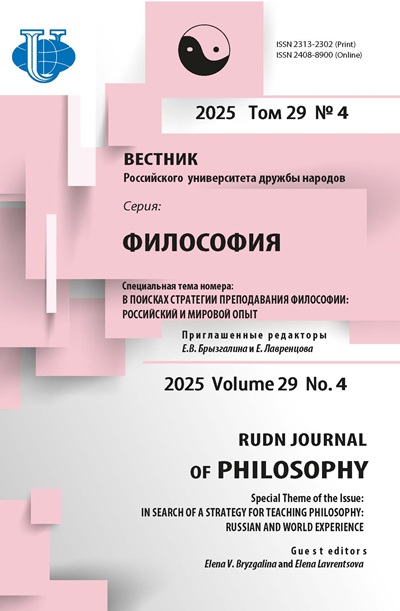Философия Аристотеля в значении онтологического статуса музыки
- Авторы: Коломиец Г.Г.1
-
Учреждения:
- Оренбургский государственный университет
- Выпуск: Том 22, № 1 (2018)
- Страницы: 55-64
- Раздел: ИСТОРИЯ ЕВРОПЕЙСКОЙ ФИЛОСОФИИ И СОВРЕМЕННОСТЬ
- URL: https://journals.rudn.ru/philosophy/article/view/18141
- DOI: https://doi.org/10.22363/2313-2302-2018-22-1-55-64
- ID: 18141
Цитировать
Полный текст
Аннотация
Автор статьи рассматривает метафизику Аристотеля в значении онтологического статуса музыки как сферу исследований философии музыки и эстетики, где музыка, во-первых, по своей сущности предстает как субстанция (самодостаточное бытие, не зависящее от суждения человека, вселенский ритм, мировая гармония) и, во-вторых, музыка как формы музыкального искусства, ценностно взаимодействующие с миром человека. В интерпретации автора аристотелевского учения о сущности музыка есть субстанциально становящееся музыкальное бытие. В процессе становления музыкальной формы действуют законы логоса, Ума, мироздания. Категории: субстанция (сущность), материя и форма, энтелехия, энергия - рассматриваются в контексте эстетики и музыкального искусства. Автор обращает внимание на то, что в вопросе существования музыки как вида искусства в мире человека Аристотеля интересовало назначение музыки для человека, где он разделял профессиональное занятие и занятие музыкой, необходимое для воспитания. Отмечая ее предназначение, по словам философа, для удовольствия, отдыха, добродетели, очищения души, было обнаружено, что способность музыки воздействовать на нравственную сторону души осталась для него открытой проблемой. Метафизика Аристотеля утвердила представление о музыке как субстанции и музыкальной форме как процессе, музыке как способе ценностного взаимодействия человека с миром, что дает убеждение в устойчивости законов становления музыкальных форм.
Ключевые слова
Об авторах
Галина Григорьевна Коломиец
Оренбургский государственный университет
Автор, ответственный за переписку.
Email: kolomietsgg@yandex.ru
доктор философских наук, профессор кафедры философии и культурологии
просп. Победы, 13, Оренбург, Россия, 460018Список литературы
- Аристотель. Категории // Аристотель. Сочинения в 4-х т. Т. 1. М.: Мысль, 1975. 550 с.
- Аристотель. Метафизика // Аристотель. Сочинения в 4-х т. Т. 1. М.: Мысль, 1975. 550 с.
- Аристотель. О душе // Аристотель. Сочинения в 4-х т. Т. 1. М.: Мысль, 1975. С. 369-450.
- Аристотель. О частях животных. М., 1937. 64 с.
- Аристотель. Политика // Аристотель. Сочинения в 4-х т. Т. 4. М.: Мысль, 1984. 830 с. С. 375-644.
- Аристотель. Поэтика // Аристотель. Сочинения в 4-х т. Т. 4. М.: Мысль, 1984. 830 с. С. 645-680.
- Асмус В.Ф. Античная философия (история философии). 3-е изд. М.: Высшая школа, 2003. 400 с.
- Гилберт К.Э., Кун Г. История эстетики. 2-е изд. М.: Прогресс, 2000. 646 с.
- Кессиди Ф.Х. Этические сочинения Аристотеля // Аристотель. Сочинения в 4-х т. Т. 4. М.: Мысль, 1984. С. 5-28.
- Коломиец Г.Г. Концепция ценности музыки как субстанции и способа ценностного взаимодействия человека с миром. Дисс.. доктора философских наук. МГУ им М.В. Ломоносова. М., 2006. 454 с.
- Кривцун О.А. Эстетика. М.: Аспект Пресс, 1998. 430 с.
- Кунцман П., Буркард Ф.-П., Видман Ф. Философия: dtv-Atlas. М.: Рыбари, 2002. С. 49.
- Лангер Сьюзен. Философия в новом ключе: Исследование символики разума, ритуала и искусства. М.: Республика, 2000. 287 с.
- Лосев А.Ф. Эстетика Возрождения. Исторический смысл эстетики Возрождения. Сост. А.А. Тахо-Годи. М.: Мысль, 1998. 750 с.
- Лосев А.Ф., Тахо-Годи А.А. Платон. Аристотель. М.: Молодая гвардия, 2005. 392 с.
- Столович Л.Н. Красота. Добро. Истина: Очерк истории эстетической аксиологии. М.: Республика, 1994. С. 30.
Дополнительные файлы















